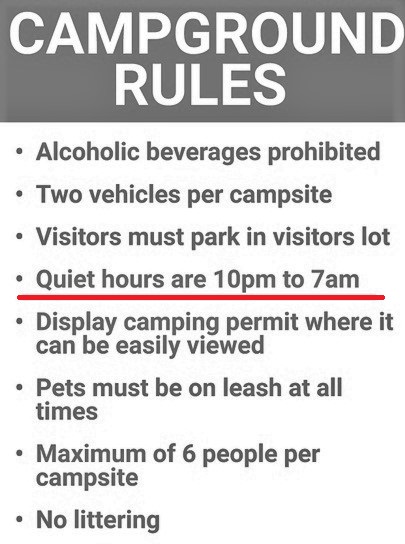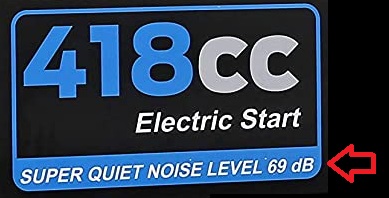![]()
Can you Run a Generator Overnight? [RV Camping]
DISCLAIMER: AS AN AMAZON ASSOCIATE I EARN FROM QUALIFYING PURCHASES. THIS POST CONTAINS AFFILIATE LINKS THAT WILL REWARD ME MONETARILY OR OTHERWISE WHEN YOU USE THEM TO MAKE QUALIFYING PURCHASES. FOR MORE INFORMATION, PLEASE READ MY EARNINGS DISCLAIMER.
It is perfectly safe to run a generator in a motorhome all night, as long as you follow safety precautions and basic courtesy rules. Keeping windows closed to avoid carbon monoxide poisoning and using an extension tank to avoid refilling it in the middle of the night will keep you out of trouble most of the time.
Boondocking traditionally involves camping off-grid and without hookups outside of a designated campground. A generator could be a life savior when you are out there in the wild and need some power to at least run your furnace or air conditioner.
With all windows and doors closed, you can sleep safely as long as a generator is far enough from the RV. Also, keeping a generator at a fairly good distance will allow you to have a better sleep (with less noise).
Many campgrounds have full hookups, but if you are in a camping area without one, you may be concerned with the noise aspect of the generator. How appropriate it is to use a generator at night with fellow campers around trying to rest? Well, that is greatly up to you.

If everyone around you is using a generator, well… you might as well use one, and don’t worry about it. In any other situation, you may want to move to a remote location with no people around or ask your neighbors if they are ok with it (never hurts to ask).
In situations like these, you may find using a battery and inverter very handy (if you just want to watch TV or run a small fan). If the air conditioner or water heater is your priority, then you either need a very large set of batteries or a generator.
It is always a good idea to charge your batteries fully before you hit the road. This way you will have a choice whether to use them (with an inverter) or use a generator.
Walmart parking lot

Try not to use your generator during the night at the Walmart or any other private parking lot (if they allowed you to stay). It’s a general courtesy to people around you and to minimize complaints to the management of the store.
Remember:
It’s a favor from their side to let you park.
They don’t need problems and lost customers. If you are doing something they don’t appreciate, they can easily stop allowing RVs to park overnight.
Using a generator during the day may be allowed, consult the store’s manager on that one. Another problem with using a generator in the parking lot is that it will make a lot more noise and vibration when it is placed on concrete vs soft ground.
Generators are noisy machines and they release fumes. If you are planning to spend a night there, try keeping it quiet.
Generator and campgrounds
Some campgrounds don’t allow generators at all because they can be VERY loud! Others will have specific rules when it comes to running your generator, so consult the management at the campground.
Typically:
They don’t want you running generators during quiet hours (which are often 10 pm to 6 am).
Your campground may also have a decibel limit and not just at quiet times, but at all times.
These rules will vary from campground to campground, so be sure to check the rules before you arrive at your destination. RV parks that are “for RVs only” typically do not have an issue with generators although they also likely provide hookups.

People go camping so they can get away from the noise of the city and the sound of a generator at night is highly likely not to be welcomed (unless they are doing it themselves). Most campgrounds that also allow “tent camping” don’t allow RV generators to run during quiet hours.
Fuel concerns
Factory-installed generator
If you have a factory-installed generator in your RV, the fuel comes straight from the RV tank. Your generator will run on this fuel until ¼ tank capacity.
After it stops pulling the fuel from the tank, you still have enough fuel (¼ of the tank) to take it to the nearest gas station. In this situation, the fuel is probably not your primary concern since RV tanks are quite large.
The amount of power you need determines how fast the fuel will be consumed by your generator. Even if the actual output (consumption) is minimal, a large generator requires relatively little fuel.
A factory-installed generator in a motorhome can operate as long as there is gas in the tank, using approximately 1 gallon of gas every 3 hours (depending on a generator and load size). With gas tanks averaging 60-100 gallons, that has a run time of 7.5 days to 12.5 days.
Portable generator
Typically, portable generators can run for 8 hours on 5 gallons of gas. Generators powered by propane gas can run approximately 5 hours on a 20 lb propane tank.
A portable gasoline generator consumes about 0.5 to 0.75 gallons of fuel per hour at 50% of its rated load, a propane generator consumes between 2 and 3 lbs of propane per hour.
For example, a 4,000-watt rated generator will use around 0.5 gal/hour of gas when generating a constant 2,000-watts of power for consumption. A typical, 5,000 watt (non-inverter) generator will consume 0.75 gal/hour.
Since inverter-type generators commonly have a throttle control feature, they are more fuel-efficient than alternator-type generators. Propane is the least efficient fuel that you can use because it provides less energy than gasoline or diesel.
A portable 2,000-watt inverter generator can run approximately 6 hours at half load on one gallon of gas. If your gasoline generator holds 4 gallons of gas, it can run for more than 8 hours with half load.
Gasoline generators are generally less efficient than diesel but are lighter and cheaper. If you would like to run your air conditioner off the generator, you’ll need it to be sized at about 4,000-watts or more.
A 4,000-watt diesel generator will run at half load for 3 hours on a gallon of fuel and about an hour on a gallon of fuel at full load.
Now, the important part:
You cannot (should not and probably don’t want to) get up in the middle of the night to fill up a gas tank!
Why? Unless your sleep-walking sessions are rather reasonable and conscious (unlike mine), you are probably do NOT want to try refilling your gas tank in the middle of the night! Here are some reasons: 
- You need to let your generator cool down before refilling the tank. What a pain! Can someone actually do that in the middle of the night or early morning?
- You need to be really, and I mean really careful filling up the gas tank. If somehow you managed to wait for your generator to cool down, now it’s time to fill it with gas. Make sure you are awake enough to do it right! No spills allowed!
- You really DON’T need to do it and can just get an extended tank kit! You can refill this tank while your generator is working, and the best part? You will have TWO tanks to keep your generator running, while you enjoy your comfortable all-night rest!
Using an extension tank like this one (Bergs System, paid link) will extend the runtime of your generator so you can get some good night’s sleep. This basically also means that you are not taking any chances with trying to fill up your tank while it’s hot or waiting in the middle of the night for it to cool down!
Here is a dual tank system from Bergs (clickable paid link below):
Propane generators are the least efficient and probably the most expensive to use, but they are the quietest of the bunch. If you have a dual fuel generator, you may want to use propane when you feel that it is appropriate.
Carbon monoxide concerns
Carbon monoxide is poisonous, colorless, odorless, and tasteless gas. It in itself has no detectable odor, so you don’t want to mess around with it.
Carbon monoxide detectors are the easiest way to detect carbon monoxide. Even if you can’t smell the leak, the carbon monoxide detector will alert you if there is a leak.
Here is a good carbon monoxide detector (paid link) that you can conveniently purchase from Amazon:
Many generators now come with a built-in sensor to shut off if the carbon monoxide levels get too high. Leaving your windows closed will also prevent any fumes or carbon monoxide from leaking into your camper too.
How to quiet a portable generator
There is no doubt that generators are noisy. Average generators put out about 70-80 decibels and if you are trying to relax, noise and vibration are not something that you look forward to.
“Super quiet” generators produce less than 70 decibels:

If you are looking for a REALLY quiet generator, then it should be in the 49-60 decibel range. This generator from Honda (paid link) works at 48 to 57 dBA range:
If the generator’s noise is your issue with not using it at night, here is what you should do:
1. Buy a quiet generator
If you don’t have a generator yet, it is a good time to consider a generator that is actually quiet. First of all, do NOT buy OPEN-frame generators, since they produce a lot more noise than closed frame generators.
Inverter-generators, on the other hand, do not have many moving parts and are built with a lot of sound-dampening material around them. These types of generators also come with idle RPM control, which basically means that if you only need a few watts, it will not run at the full speed (therefore will not be so noisy).
2. Put your generator on something soft
You can use an anti-vibration mat or place it directly on the grass to dampen the sound. Inexpensive rubber pads can do the trick as well.
Placing a generator on the concrete will make it even noisier and increase vibration. It may get so bad, that you will actually feel the vibration inside your RV.
For more ideas on how to quiet your generator click on this article: “How to quite a generator (tips and tricks“

Click on the white button above to find your electrician!






